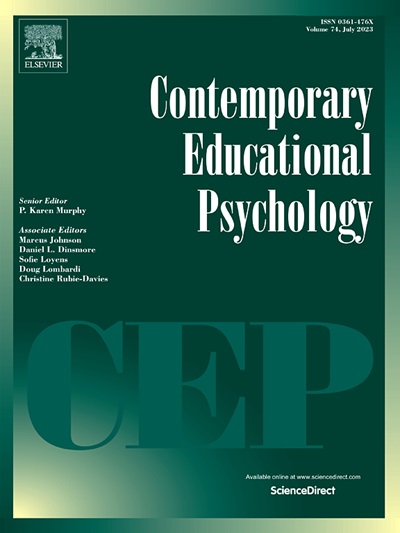The process and prediction of school completion: A six-year longitudinal examination
IF 3.8
1区 心理学
Q1 PSYCHOLOGY, EDUCATIONAL
引用次数: 0
Abstract
This study investigated the process and prediction of school completion among a sample of 9,151 Australian secondary students. Although research indicates that various factors are associated with school completion, most studies have been short-term or limited in scope, leaving gaps in understanding about which factors throughout secondary school are salient for school completion. This study aims to fill those gaps by examining perceived teaching support in Year 7 as a predictor of personal attributes in Year 9 (perceived competence, valuing, growth goals, and academic skills) and, in turn, intentions in Year 10 (completion intentions, university intentions, vocational education and training [VET] intentions). All factors were then examined as predictors of school completion in Year 12. Results indicated key associations in the model: perceived teaching support (Year 7) predicted perceived competence, valuing, and growth goals in Year 9; all personal resources (Year 9) predicted at least one of the Year 10 intentions and most associations were positive; and, academic skills, completion intentions and university intentions predicted Year 12 school completion. In subsidiary analyses, we also tested how the factors were associated across three different geographic locations: rural, regional, and city areas. These subsidiary results indicated many similarities with the main model, along with some notable differences across locations. Findings hold implications for efforts aimed at supporting secondary school pathways to school completion in general and across different geographic locations.
完成学业的过程和预测:六年纵向研究
本研究以9,151名澳洲中学生为样本,调查学业完成的过程与预测。尽管研究表明,各种因素与学业完成有关,但大多数研究都是短期的或范围有限的,因此在了解整个中学阶段哪些因素对学业完成有显著影响方面存在空白。本研究旨在填补这些空白,通过检测七年级的感知教学支持作为九年级个人属性(感知能力、价值、成长目标和学术技能)的预测因子,进而检测十年级的意向(完成意向、大学意向、职业教育和培训[VET]意向)。然后将所有因素作为12年级完成学业的预测因素进行检查。结果显示了模型中的主要关联:感知教学支持(七年级)预测九年级的感知能力、评价和成长目标;所有的个人资源(9年级)至少预测了10年级的一个意向,大多数的关联是积极的;学业技能、学业完成意向和大学意向对12年级学业完成有预测作用。在辅助分析中,我们还测试了这些因素如何在三个不同的地理位置之间相互关联:农村、区域和城市地区。这些辅助结果表明与主模型有许多相似之处,但在不同地点之间存在一些显著差异。研究结果对旨在支持中学升学途径的努力具有启示意义,这些努力在总体上和在不同的地理位置上都是如此。
本文章由计算机程序翻译,如有差异,请以英文原文为准。
求助全文
约1分钟内获得全文
求助全文
来源期刊

Contemporary Educational Psychology
PSYCHOLOGY, EDUCATIONAL-
CiteScore
16.50
自引率
3.90%
发文量
74
期刊介绍:
Contemporary Educational Psychology is a scholarly journal that publishes empirical research from various parts of the world. The research aims to substantially advance, extend, or re-envision the ongoing discourse in educational psychology research and practice. To be considered for publication, manuscripts must be well-grounded in a comprehensive theoretical and empirical framework. This framework should raise critical and timely questions that educational psychology currently faces. Additionally, the questions asked should be closely related to the chosen methodological approach, and the authors should provide actionable implications for education research and practice. The journal seeks to publish manuscripts that offer cutting-edge theoretical and methodological perspectives on critical and timely education questions.
The journal is abstracted and indexed in various databases, including Contents Pages in Education, Australian Educational Index, Current Contents, EBSCOhost, Education Index, ERA, PsycINFO, Sociology of Education Abstracts, PubMed/Medline, BIOSIS Previews, and others.
 求助内容:
求助内容: 应助结果提醒方式:
应助结果提醒方式:


